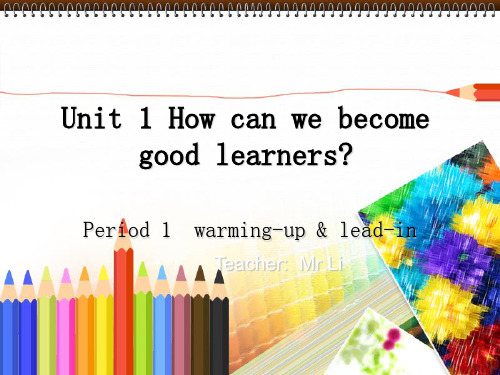人版九年级英语第一单元课件(1)
合集下载
Unit1SectionA课件人教版英语九年级全册(完整版)

Listen and answer the questions below.
1. Where are they?
They are in an English club.
2. What are they talking about?
The best ways to learn English.
3. How many methods mentioned in the talk.
Lead-in
How long have you learnt English? Are you a good English learner? How do you learn English?
Question time
How does reading improve your English?
人教版英语九年级全一册
Section A 1a-2d
Learning objects (学习目标)
By the end of the class, you will be able 1to. l…earn some curriculum words:
textbook conversation aloud pronunciation sentence patient 2. talk about the ways about how to study. 3. improve your listening and speaking ability.
1b Listen. How do these students study for
a test? Write letters from 1a above.
a. by working with friends b. by making word cards c. by reading the textbook d. by listening to tapes e. by asking the teacher for help
人教版九年级全册Unit1课件 (共25张PPT)

Are these habits good or bad? Why?
listening to music when learning
sleeping in class
talking with other students in class
They are not good habits for learning English.
1. What does “Practice makes perfect.” mean? Keep practicing. 2. If successful learners make mistakes, what do they often do? They learn from mistakes.
Read, study and learn about everything imporant in your life
Read Paragraph 3 and answer the questions.
Practicing and learning from mistakes Good learners think about what they are good at and what they need to practice more. Remember, “Use it or lose it.” Even if you learn something well, you will forget it unless you use it. “Practice makes perfect.” Good learners will keep practicing what they have learned, and they are not afraid of making mistakes. Alexander Graham Bell did not invent the telephone overnight. He succeeded by trying many times and learning from his mistakes.
listening to music when learning
sleeping in class
talking with other students in class
They are not good habits for learning English.
1. What does “Practice makes perfect.” mean? Keep practicing. 2. If successful learners make mistakes, what do they often do? They learn from mistakes.
Read, study and learn about everything imporant in your life
Read Paragraph 3 and answer the questions.
Practicing and learning from mistakes Good learners think about what they are good at and what they need to practice more. Remember, “Use it or lose it.” Even if you learn something well, you will forget it unless you use it. “Practice makes perfect.” Good learners will keep practicing what they have learned, and they are not afraid of making mistakes. Alexander Graham Bell did not invent the telephone overnight. He succeeded by trying many times and learning from his mistakes.
新人教版九年级全一册英语 Unit 1 第1课时 教学课件

第二页,共二十五页。
新课导入
思 考思 考 What do you usually do when you study English?
I often read English books.
I often make word cards.
第三页,共二十五页。
课导入
思考
I usually listen to English songs.
5. __√__ Have you ever studied with a group?
__a____
第十五页,共二十五页。
新课讲解 2b Listen again. Match each other below with a question above.
a. Yes, I have. I’ve learned a lot that way. b. Oh, yes. It improves my speaking skills. c. I do that sometimes. I think it helps. d. No. It’s too hard to understand spoken English.
you enjoy every day. The more you read, the faster you’ll be.
adj.有耐心的
第十八页,共二十五页。
新课讲解
2d Read the conversation, try to answer questions.
1. What makes Jack feel a little nervous? He has to finish reading a book and give a report next Monday.
新课导入
思 考思 考 What do you usually do when you study English?
I often read English books.
I often make word cards.
第三页,共二十五页。
课导入
思考
I usually listen to English songs.
5. __√__ Have you ever studied with a group?
__a____
第十五页,共二十五页。
新课讲解 2b Listen again. Match each other below with a question above.
a. Yes, I have. I’ve learned a lot that way. b. Oh, yes. It improves my speaking skills. c. I do that sometimes. I think it helps. d. No. It’s too hard to understand spoken English.
you enjoy every day. The more you read, the faster you’ll be.
adj.有耐心的
第十八页,共二十五页。
新课讲解
2d Read the conversation, try to answer questions.
1. What makes Jack feel a little nervous? He has to finish reading a book and give a report next Monday.
仁爱版 初三英语九年级上册Unit1 Topic1PPT课件

Unit 1 The Changing World
Topic 1 Our country has developed rapidly. Section A
2024/8/23
2024/8/23
2024/8/23
• have/has been to…去过。。。 • He has been to Hubei. • 他去过了湖北 (人已经不在湖北) • I have been to Beijing. • 我去过了北京。(人已经不在北京) • have/has gone to... • 已经去了,它强调主语此时不在说话地点。 • e.g. She has gone to Hubei. • 她已经去了湖北。(人已经不在说话地点) • She has gone to Beijing. • 他已经去了北京。 (人已经不在说话地点)
2024/8/23
p124
2024/8/23
Find the sentences with Present Perfect Tense in Section A. Read them aloud.
You have just come back from your hometown.
Great changes have taken place there and my hometown has become more and more beautiful.
2024/8/23
2a TLhisetennetoxtthedcaoyn,vMerasartiiaoncaanmd feillbinatchke .blSanhkes.mTheetn practice it withMyoicurhpaaertlneirn. the school.
Topic 1 Our country has developed rapidly. Section A
2024/8/23
2024/8/23
2024/8/23
• have/has been to…去过。。。 • He has been to Hubei. • 他去过了湖北 (人已经不在湖北) • I have been to Beijing. • 我去过了北京。(人已经不在北京) • have/has gone to... • 已经去了,它强调主语此时不在说话地点。 • e.g. She has gone to Hubei. • 她已经去了湖北。(人已经不在说话地点) • She has gone to Beijing. • 他已经去了北京。 (人已经不在说话地点)
2024/8/23
p124
2024/8/23
Find the sentences with Present Perfect Tense in Section A. Read them aloud.
You have just come back from your hometown.
Great changes have taken place there and my hometown has become more and more beautiful.
2024/8/23
2a TLhisetennetoxtthedcaoyn,vMerasartiiaoncaanmd feillbinatchke .blSanhkes.mTheetn practice it withMyoicurhpaaertlneirn. the school.
九年级英语人教版全册Unit1_SectionA(2a-2d)精品课件 (1)

Name
How to study for a test?
Report: XX studies for a test by …
2d Role-play conversation.
Jack: Annie, I’m a little nervous. I have to finish reading a book and give a report next Monday.
English? 3. __ What about listening to tapes?
√ 4. __ What about reading aloud to practice
pronunciation?
√ 5. __ Have you ever studied with a group?
2b
Listen again. Match each question above with an answer below.
a. Yes, I have. I’ve learned a lot that way.
b. Oh, yes. It improves my speaking skills.
c. I do that sometimes. I think it helps.
d. No. It’s too hard to understand spoken English.
pronunciation? 5. _a_ Have you ever studied with a group?
Summary
❖have conversations with ❖read aloud ❖study with a group ❖speaking skills ❖spoken English
Unit 1 课件人教版九年级全册

Paul: That might really help! Thanks.
Ms. Manson: Can you understand when people talk to you?
Tapescript
Unit 1 Section B (1a-1e)
Paul: Well, not always. Sometimes I just don’t understand what
Tapescript
Unit 1 Section B (1a-1e)
Ms. Manson: You look worried, Paul. Paul: I am, Ms. Manson. I’m having trouble learning English. Ms. Manson: You said you liked English. What’s the problem? Paul: I can’t get the pronunciation right. Ms. Manson: Well, listening can help. Why don’t you listen to
Language points
5 “疑问词 + 动词不定式”作宾语
Unit 1 Section B (1a-1e)
“how to increase my reading speed”是“疑问词+动词不定式” 结构,在句中作“know”的宾语。
疑问词+to do:
how to do sth. what to do
English songs on the radio and repeat the difficult words?
Tapescript
Unit 1 课件(共35张PPT) 人教版九年级全册

1) It is no use/ good / useless + doing... 2) It is a waste of time + doing ... 3) It is fun + doing ... 在以上结构中常用动名词作主语。 It’s no use crying over spilt milk. 覆水难收。 It is fun playing with children. 和孩子们一起玩真好。
New words
Unit 1 Section A (Grammar Focus-4c)
repeat /rɪˈpiːt/
v.重复;重做
note /nəʊt/
n. 笔记;记录 v.注意;指出
pal /pæl/ n.朋友;伙伴 physics /ˈfɪzɪks/ n. 物理;物理学
chemistry /ˈkemɪstri/
A. playing B. to play C. play
Textbook
Unit 1 Section A (Grammar Focus-4c)
4a Match the questions and answers.
1. How do you practice speaking?
a. By watching English programs.
A. tell B. to tell C. telling
Grammar Focus
Unit 1 Section A (Grammar Focus-4c)
2. 用作宾语 1)作动词的宾语 常见的此类动词有:practise, understand, worry about, finish, give up, keep, keep on, look forward to, mind, miss, enjoy, depend on, cannot help, suggest, pay attention to, think about, succeed in, be used to, get used to, put off,等。
人教版九年级英语unit1 ppt课件

the world? 你曾经想要周游世界吗?
注意:never, ever一般置于助动 词have/has之后,过去分词之前。
20
have been to与have gone to 的 1. have (has) been区to别意为“曾经去
过某地”,表示现在已经不在那里
了。可与just, ever, never等连用。 如:
她要求我做更多工作。
8
1b Listen. How do this students study for a test? Write letters from 1a above.
_____b____1. Meiping
_____d_____3. Tony
ቤተ መጻሕፍቲ ባይዱ
____e_____2. Peter
9
1c. Make conversations about how you study for a test.
23
同学们要注意现在完成时与一般过去
时的区别。虽然这两个时态都和过去
发生的事情有关,但是现在完成时强
调这一动作与现在的关系,如对现在
产生的结果、影响等,而一般过去时
只表示过去的事实,不表示和现在的
关系。如:
24
I have just been to London. I went
there last month.
17
2. 否定句:现在完成时的否定句式是 “haven’t(hasn’t)+过去分词”。
3. 疑问句:现在完成时的一般疑问句式 是把助动词have或has提到主语之前。 回答用Yes, …have (has). /No, …haven’t (hasn’t).
连用时间状语:already, yet, ever,
注意:never, ever一般置于助动 词have/has之后,过去分词之前。
20
have been to与have gone to 的 1. have (has) been区to别意为“曾经去
过某地”,表示现在已经不在那里
了。可与just, ever, never等连用。 如:
她要求我做更多工作。
8
1b Listen. How do this students study for a test? Write letters from 1a above.
_____b____1. Meiping
_____d_____3. Tony
ቤተ መጻሕፍቲ ባይዱ
____e_____2. Peter
9
1c. Make conversations about how you study for a test.
23
同学们要注意现在完成时与一般过去
时的区别。虽然这两个时态都和过去
发生的事情有关,但是现在完成时强
调这一动作与现在的关系,如对现在
产生的结果、影响等,而一般过去时
只表示过去的事实,不表示和现在的
关系。如:
24
I have just been to London. I went
there last month.
17
2. 否定句:现在完成时的否定句式是 “haven’t(hasn’t)+过去分词”。
3. 疑问句:现在完成时的一般疑问句式 是把助动词have或has提到主语之前。 回答用Yes, …have (has). /No, …haven’t (hasn’t).
连用时间状语:already, yet, ever,
- 1、下载文档前请自行甄别文档内容的完整性,平台不提供额外的编辑、内容补充、找答案等附加服务。
- 2、"仅部分预览"的文档,不可在线预览部分如存在完整性等问题,可反馈申请退款(可完整预览的文档不适用该条件!)。
- 3、如文档侵犯您的权益,请联系客服反馈,我们会尽快为您处理(人工客服工作时间:9:00-18:30)。
4. frustrating 令人失望的
如:He finds watching movies frustrating because the people speak too quickly.他 觉得看电影很扫兴,因为电影中演员说话 太快了。
5. quickly 快地,迅速地
6. spoken 口语的,口头的 如: Spoken English 英语口语 辨析:Speaking 讲话的, 说某种语言的 ~ skills
10.learner 学习者 如:He is a good language learner.他是一
个优秀的语言学习者。
11.term学期 At the end of a term 在学期末 At term 到期
12.trouble 困难,苦恼,忧虑 如:She had trouble making complete
A: How do you study English? B: I study by doing … C: Do you … / What about …?
Have you ever …? D: Yes …
No …
I’ve learned a lot that way. It improves my speaking skills. I think it helps. It’s useful / helpful / effective.
常与speak, talk, laugh等动词连用,多用于 比较级,须放在动词之后。如:
She told us to speak a little louder. 她让我 们说大声一点。
③loudly是副词,与loud同义,有时两者可替 换使用,但往往含有令人讨厌或打扰别人的 意思,可位于动词之前或之后。
(Flashcard)
by making flashcards
by reading textbooks
by making vocabulary lists
by listening to tapes
by asking the teacher for help
by studying with a group
7. slowly 慢地,缓慢地 辨析:slow 与 slowly Slow 除了做形容词外,还可做副词,做副词 时与slowly有所不同。Slow的位置一般在动
词之后,而slowly位置一般在句首,动词前 或后,也可以在句末。如:walk slow 慢走, Slowly he walked away.他慢慢走掉了。
11. lose 失去,丧失
如:Unless you enjoy losing face you will do better in learning English.学号英语你必须热爱丢 脸。
4. pronounce 发…音, 正确(或清晰地)吐(字, 音等)
5. realize 认识到,了解到
如:I realized that it doesn’t matter if you don’t understand every word.
我意识到不理解每一个单词没有关系。
6. matter 重要,要紧,有关系
by surfing the Internet
by reading in the library
by joining a club
by watching English programs on TV by enjoying English songs by taking part in English classes by getting an English tutor by reading English magazines and newspapers by taking notes carefully by having the English class carefully by finishing my homework seriously …
8.solution (问题,疑难等的)解决,解答
如:the solution to the problem 解决问秘密 A top secret 绝密 Keep a secret 保守秘密 Reveal a secret 泄露秘密 A secret agent 特务
friends was not helpful at all .她接着说吧 和朋友们聊天毫无作用。
拓展 1) add sth to sth. 添加 ,增加
如: If you add five to nine ,you will get fourteen . 2)add up to 总计 例 如: These numbers add up to 177
如:It doesn’t matter. 没有关系。
As a matter of fact.事实上,其实
No matter how (或 what,where,who,whether…) 不管怎样(什 么,何时,哪里,谁,是否)
7. impress 使感动,使…印象深刻
如:My teacher is very impressed.我的老 师让人印象非常深刻。
如:The teacher asked us to write an essay about our mothers.老师叫我们写一 篇关于妈妈的短文。
A bold essay 大胆的尝试
Make an essay to do 试图做….
14.duty 责任,义务 如:She felt it was her duty to report the
8. afraid 害怕的,犯愁的 be afraid of害怕去做,不敢去做
plete 完整的,完全的 如:make complete sentences with 用„
造完整的句子 10. fast 快地,迅速地 11.soft 软的,柔软的
12.easily容易地,简单地 13.unimportant 不重要的
sentences.她造句有困难 Ask /look for trouble 自找麻烦 In trouble 处于不幸(或苦恼,困境)中 Make trouble 闹事,捣乱,捣蛋 Get into trouble 招致不幸,陷入困境,被
捕,入狱
13.essay 文章(尤指短文,小品文,散文)
如:A bosom friend afar brings distant land here.海内存知己,天涯若比邻。
16.disagreement 分歧,不一致,意见不合 Have a disagreement with sb. 与某人意见
不一
17.development 发育,成长,发展,进展
三,动词及其他
1. memorize 记住,熟记 如:An actor must be able to ~ his lines. 演员善于熟记台词。 2. frustrate 使失望,使沮丧,使厌烦 3. add 补充,继续说 She added that having conversations with
Unit one How do you study for a test?
姓名:姚海宇
目录
引言Lead in
请在此处输入您的文本 请在此处输入您的文本
引言
Lead in
How do you study English? I study English by …
(Friendship)
by working with friends
by listening to English-language music
by watching an English movie
by listening to the teacher in class. by taking English classes
by communicating with foreigners
It’s too hard to understand the voice. It’s difficult to catch the meaning. I don’t think it’s useful / helpful.
名词单词学习
1. flashcard (上面有单词或图画,用于教 学的)抽认卡
19.soldier 士兵,军人 用法:
陆
海
Army 陆军 Navy 海军
空 The air force 空军
Solider 陆军军人
Sailor 海军军人
Pilot 空军军人
20.psychologist 心理学家,心理学研究者
二,形容词及副词
1.aloud 出声地,大声地 aloud, loud与loudly的用法 三个词都
如: He does not talk loudly or laugh loudly in public. 他不当众大声谈笑
2. specific 明确的,具体的 Specifically 明确地,特殊地 3. differently 不同地,有区别地 如:feel differently 感受不同
与"大声"或"响亮"有关。 ①aloud是副词,重点在出声能让人听见,
但声音不一定很大,常用在读书或说话上。 通常放在动词之后。aloud没有比较级形 式。 如: He read the story aloud to his son.他 朗读那篇故事给他儿子听。 ②loud可作形容词或副词。用作副词时,
8. deal 处理,应付 9. solve 解决,解答(难题等)如:
solve a problem 解决困难 10. regard 将…视为 regard sb. / sth. as =
